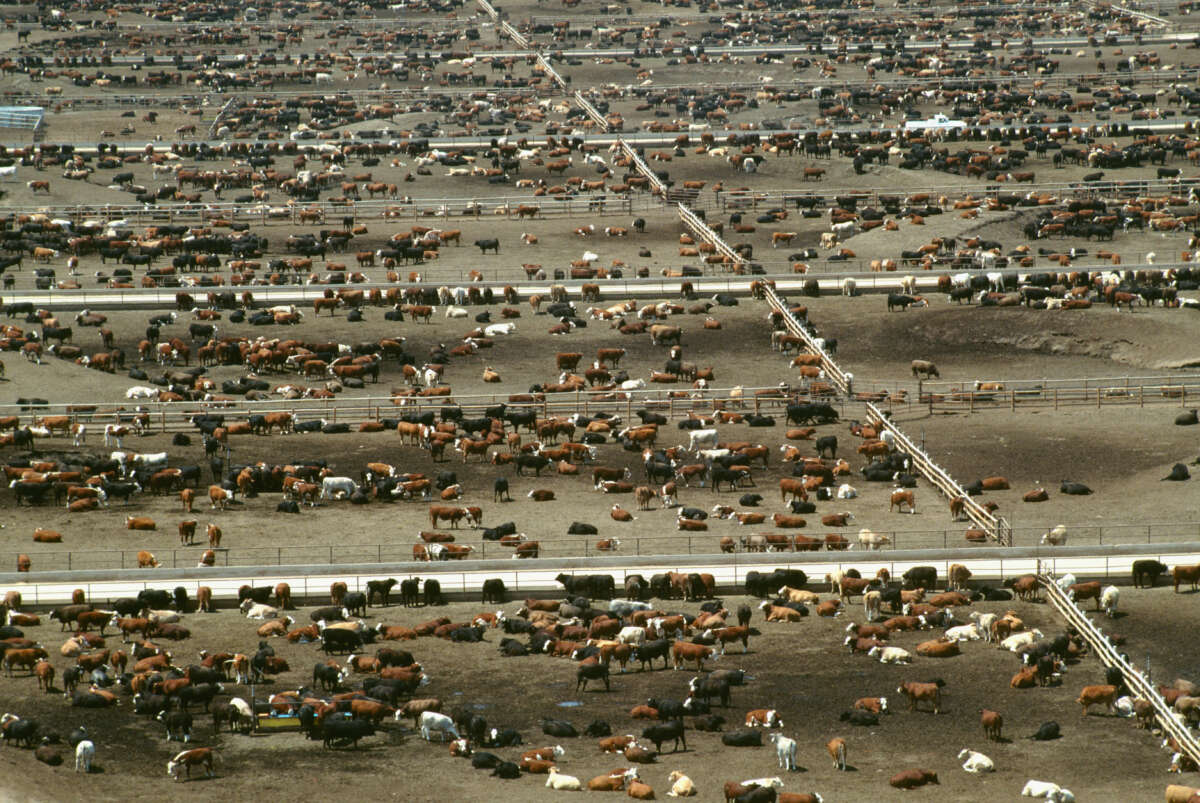Support justice-driven, accurate and transparent news — make a quick donation to Truthout today!
Powerful meat corporations are planning to push false claims that meat is “sustainable nutrition” at COP28, an international environmental conference that meets yearly to establish a global response to the climate crisis.
The meat lobbyists’ pro-meat communications strategy is contradicted by research showing that 57 percent of the greenhouse gas emissions attributed to food production are generated by meat, aquaculture, dairy and eggs.
“It’s no surprise that the meat industry — which is as shameless in its insatiable quest for profits as the tobacco industry — is pulling out all the stops in an attempt to dupe decisionmakers,” Delcianna J. Winders, Animal Law and Policy Institute Director at Vermont Law and Graduate School, told Truthout.
It has become increasingly evident in recent years that greenhouse gas emissions from agriculture must be addressed in order for wealthy countries to reach their climate goals. A recent report by the Intergovernmental Panel on Climate Change (IPCC) acknowledged that a rapid shift toward a plant-based food system is necessary for humanity to avoid catastrophic planetary collapse.
“Any credible action to reduce emissions in the food sector will inevitably lead to a reduction in the total volume of meat and dairy products produced,” Nusa Urbancic, CEO of campaign group the Changing Markets Foundation, told The Guardian. “The industry is terrified of that and has been deploying multiple tactics to delay the inevitable.”
In response to concerns regarding animal agriculture’s impact on global emissions, COP28 adopted a predominantly-plant based food menu this year. COP28’s catering move toward a plant-based menu is a notable departure from the meat-heavy menus that have previously faced criticism at the United Nation (UN) conference. A study by the Livestock, Environment, and People (LEAP) project found that plant-based diets have the potential to reduce greenhouse gas emissions and water pollution by 75 percent, compared to high mean-consuming diets.
The UN Food and Agriculture Organization (UN FAO) is expected to publish a comprehensive roadmap during the COP28 summit on why limiting meat consumption is necessary to put the global agrifood industry in line with the Paris climate agreement. This non-binding plan could contribute to policy and investment decisions that may hasten a reduction of meat production in order to mitigate the climate crisis.
“[T]he science is clear: If we are going to abate climate catastrophe, we must significantly curtail meat production,” Winders told Truthout.
The UN’s recent research showing that the world’s wealthiest nations must curb their meat consumption in order to reach climate goals — and COP28’s menu changes and host of panels on plant-based eating and meat alternative technology at this year’s conference — have made large meat companies like JBS extremely nervous. According to documents acquired by The Guardian, JBS and other big industry players, such as the Global Dairy Platform and the North American Meat Institute, are planning on coming out “full force” at the summit.
“These companies are stepping up their game because the exposure they are facing is stepping up,” Jennifer Jacquet, professor of environmental science and policy at the University of Miami, told The Guardian. “It used to be that they were caught on the back foot, but now they’re completely prepared.”
The documents produced by the industry-funded Global Meat Alliance (GMA) show that members of the trade group have been asked to stick to key communication strategies, which include falsely alleging that meat production is actually beneficial to the environment. Meat companies at the summit will be accompanied by the lobby group North American Meat Institute (NAMI), which, in 2022, was still casting doubt on whether climate change was caused by humans on its website.
“It’s incumbent on our decision makers put the interests of the planet and all who call it home above those of the small handful of multibillion dollar corporations profiting off environmental devastation,” Winders told Truthout.
Trump is silencing political dissent. We appeal for your support.
Progressive nonprofits are the latest target caught in Trump’s crosshairs. With the aim of eliminating political opposition, Trump and his sycophants are working to curb government funding, constrain private foundations, and even cut tax-exempt status from organizations he dislikes.
We’re concerned, because Truthout is not immune to such bad-faith attacks.
We can only resist Trump’s attacks by cultivating a strong base of support. The right-wing mediasphere is funded comfortably by billionaire owners and venture capitalist philanthropists. At Truthout, we have you.
Truthout has launched a fundraiser to raise $41,000 in the next 7 days. Please take a meaningful action in the fight against authoritarianism: make a one-time or monthly donation to Truthout. If you have the means, please dig deep.
